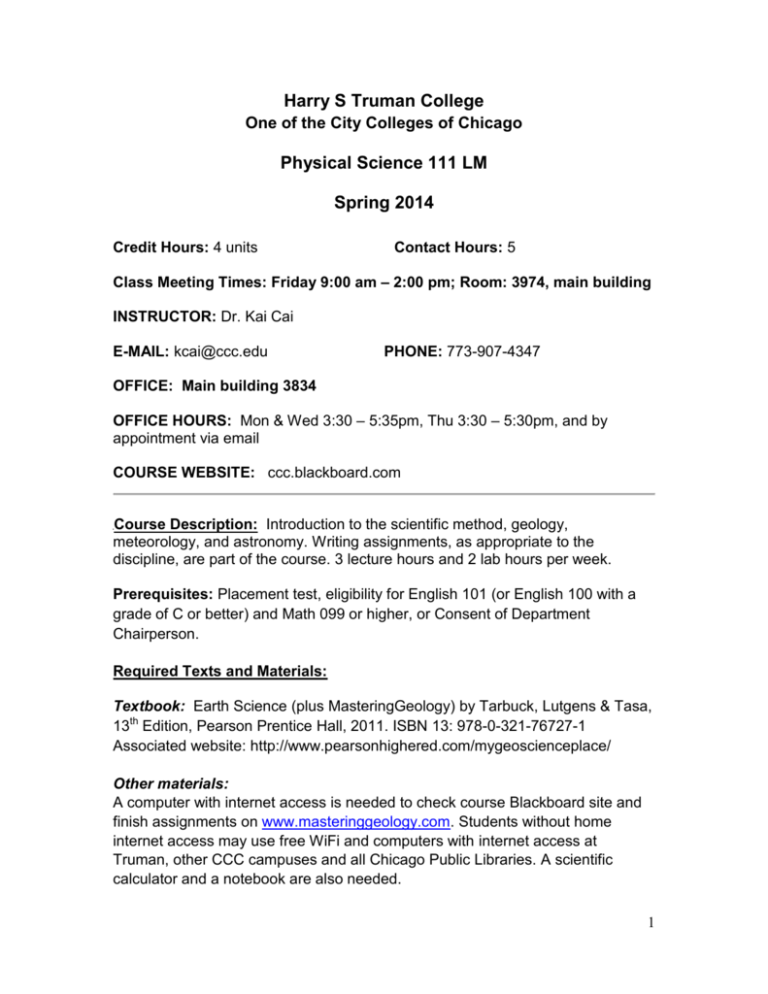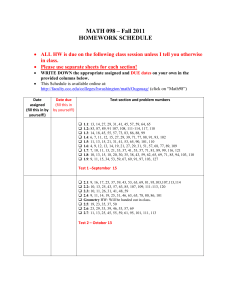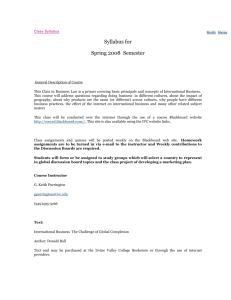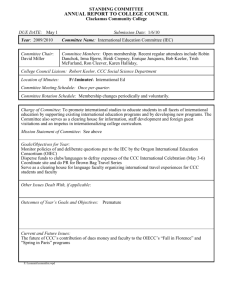
Harry S Truman College
One of the City Colleges of Chicago
Physical Science 111 LM
Spring 2014
Credit Hours: 4 units
Contact Hours: 5
Class Meeting Times: Friday 9:00 am – 2:00 pm; Room: 3974, main building
INSTRUCTOR: Dr. Kai Cai
E-MAIL: kcai@ccc.edu
PHONE: 773-907-4347
OFFICE: Main building 3834
OFFICE HOURS: Mon & Wed 3:30 – 5:35pm, Thu 3:30 – 5:30pm, and by
appointment via email
COURSE WEBSITE: ccc.blackboard.com
Course Description: Introduction to the scientific method, geology,
meteorology, and astronomy. Writing assignments, as appropriate to the
discipline, are part of the course. 3 lecture hours and 2 lab hours per week.
Prerequisites: Placement test, eligibility for English 101 (or English 100 with a
grade of C or better) and Math 099 or higher, or Consent of Department
Chairperson.
Required Texts and Materials:
Textbook: Earth Science (plus MasteringGeology) by Tarbuck, Lutgens & Tasa,
13th Edition, Pearson Prentice Hall, 2011. ISBN 13: 978-0-321-76727-1
Associated website: http://www.pearsonhighered.com/mygeoscienceplace/
Other materials:
A computer with internet access is needed to check course Blackboard site and
finish assignments on www.masteringgeology.com. Students without home
internet access may use free WiFi and computers with internet access at
Truman, other CCC campuses and all Chicago Public Libraries. A scientific
calculator and a notebook are also needed.
1
Course Objectives: The mission of this course is to provide the general
education student with a background in the areas of geology, meteorology, and
astronomy.
Student Learning Outcomes:
students will be able to:
Upon successful completion of this course,
In Geology:
Differentiate between minerals and rocks and identify many of the common
rocks.
Classify types of rocks and draw the rock cycle.
List causative agents and products of various types of erosion.
Describe the causes and results of diastrophism.
Classify earthquake waves, faults and types of unconformities.
Use the laws of geology to determine the relative age of rock structure.
Describe the gross structure of the Earth, i.e., crust, mantle, core.
Sort and identify a mixture of minerals according to their physical properties
Identify geological land forms and describe their origin.
Relate diastrophism and land forms to tectonic plate motion.
In Meteorology:
Describe the structure and composition of the atmosphere.
Describe atmospheric circulation patterns.
Read simple weather maps and identify fronts, air masses and wind direction.
Describe the movement of air about high and low pressure centers.
Use principles of air mass and frontal movement to predict weather in various
parts of the U.S. using maps and weather satellite information.
In Astronomy:
Give evidence of the sphericity, rotation and revolution of the Earth.
Use latitude and longitude to identify geographical and time zones on Earth.
Describe the motions of the Earth and the Moon in their orbits
State and explain the various cosmological models.
List Kepler's Laws.
Use scale models as they relate to astronomical systems.
List types of stars and describe the process of stellar evolution.
Describe composition, structure, and possible origin of the solar system.
Describe the structure and evolution of the universe.
Generally:
Use laboratory equipment to perform experiments and demonstrations.
2
Method of Instruction: The format will be a combination of direct instruction
lecture type, followed by activities like cooperative learning. Special attention is
given to laboratory sessions.
Definition / Statement of Active Pursuit of the Course:
District and College attendance policies are listed in the college catalog and the
Student Policy Manual:
http://www.ccc.edu/departments/Documents/studentpolicymanual.pdf
At midterm all professors must submit a grade that reflects the performance of
each student. Students will be dropped from the class for lack of active
participation for any of the following reasons:
1. 50% of lectures
2. 50% of homework
3. 50% of quizzes
4. 50% of tests
5. 70% of laboratory experiments that must be completed.
Successful completion of a laboratory session refers to full participation in a
laboratory experiment and the submission of the corresponding lab report.
A student who is not actively participating in any one of the items listed
above can be dropped at the mid-term and receive a grade of ADW
(Administrative Withdrawal).
NSW (No Show Withdrawal): If a student registered for the course before the
start time of the first class period, but 1) did not attend the first 2 classes, or 2)
attended only one of the first 3 classes and failed to notify the instructor of his or
her intentions to continue the class, the Registrar’s Office will remove the student
from the course.
Academic integrity: The City Colleges of Chicago is committed to the ideals of
truth and honesty. In view of this, students are expected to adhere to high
standards of honesty in their academic endeavor. Plagiarism and cheating of
any kind are serious violations of these standards and will result,
minimally, in the grade of “F’ by the instructor.
Student Conduct: City Colleges of Chicago students are expected to conduct
themselves in a manner which is considerate of the rights of others and which
will not impair the educational mission of the College. Misconduct for which
3
students are subject to College Discipline (e.g. expulsion) may include the
following: (1) all forms of dishonesty such as stealing, forgery, (2)
obstruction or disruption of teaching, research, administration, disciplinary
proceeding, (3) physical or verbal abuse, threats, intimidation, harassment,
and/or other conduct that threatens or endangers the health or safety of
any person, and (4) carrying or possession of weapons, ammunition or
other explosives.
Classroom Etiquette:
Please turn off or set to vibrate your cell phones.
No food allowed in the classroom.
To avoid disruptions, students are expected to arrive on time and to remain
in class for the duration. If you are late, sit near the door quietly and come to
the podium only during the break.
Respect others regardless of gender, religion, and ethnicity.
Clean the desk after each lab and return the apparatus to the appropriate
locations.
Grading:
The students will be evaluated according to the following weighted formula:
4 Exams (best three out of four + the exit exam): 40%
Lab experiments and activities: 20%
Homework: 20%
Quizzes: 10%
Class activities: reading assignments, in-class exercises, group work,
presentations, attendance, etc. 10%
Total = 100% (Note: the percentages are subject to small adjustments)
Your final grade will be computed according to the following scale:
86 %
76 %
65 %
55 %
≤
≤
≤
≤
A ≤ 100%
B < 86 %
C 75 %
D < 65 %
F < 55%
4
Note: The exit test will be given in two parts along with Exam 2 and the
Final Exam. If a student falls below 40% on the exit test then the student
will get a final grade of D or below.
Lectures:
As you can see from the schedule on page 8 the pace of the lectures will be very
fast so it is important that you attend all lectures. Some lectures may include
extra materials which may appear in exams. Students are expected to read the
assigned/relevant topics on the textbook before each session and take careful
notes in the lectures. There may be reading assignments to be completed before
each class session. While class is in session, Cell phones or similar electric
devices should not ring or make noise anytime. Side conversations are also
prohibited. Students who impede the learning of others may be asked to leave for
the remainder of the lecture or laboratory and may be subject to disciplinary
action.
Absentee Policy: If a student misses for whatever reason a quiz or a laboratory
session (only those not requiring lab devices), the student can do a make-up only
once on each of these, at the discretion of the instructor. No make-up lab
experiments will be provided. Note absence does not excuse a student from
completing the course work, like homework and/or lab reports. If a student
misses a class he or she should do the following: a) check announcements on
Blackboard, b) read through the materials covered in the missed class, and c)
attempt to do the homework or other applicable assignments. Students are
responsible for all missed announcements, assignments and other class work.
Any make-up activity will only be arranged after exhausting all the other options
(see above). At the end of the semester, attendance record may be counted as a
part of the participation points and accounts for no more than 5% of the overall
grade. If you wish to withdraw from the class, it is your responsibility to do so
officially by Monday, April 7. After the midterm, if you simply quit coming to class
without dropping the course, you will receive a grade of F and lose your tuition.
Homework: It is important that you do assigned reading each week, monitor the
course Blackboard site for announcements and view the assigned videos. Most
homework will be assigned online at www.masteringgeology.com, and due by the
following week. The exact due date for each of the homework will be announced
in class when assigned and posted on the MasteringGeology website. After one
week pass of the due date, the homework will be accepted only with partial
5
credit. In general, the instructor will not offer any assistance with late homework
assignments. A waiver of the late penalty given extenuating circumstances will
be considered on a case-by-case basis with appropriate documentation.
Course ID on MasteringGeology: PHYSCI111S14CAI
Laboratory: All students are required to perform about 13 lab experiments, one
each week on average. Each experiment will be performed by groups of two or
three students, but lab reports are required to be submitted individually. Details
will be provided for each lab experiment. Students are expected to preview the
lab setup (if available) before each lab session. Due to equipment availability
issues, NO make-up labs will be given. Lab reports are expected to be submitted
on time, with all questions answered clearly and legibly and all pages neatly
stapled (not folded or mutilated) together. Points will be deducted for late reports,
messy reports, incomplete sentences, and handwriting that is difficult to read.
Points will also be deducted for errors in content.
Blackboard Discussions:
Each student is expected to post at least one discussion post on Blackboard by
the end of the semester. This will be counted as a part of your class activities
(see Grade breakdown on page 4).
Exit Exam: to access student learning outcomes in , all students will take an Exit
Exam. It contains 50 questions and is administered in two parts: Part I covers
materials from Chapters 1 through 11 (geology), and Part II covers materials
from Chapters 16 to 24 (meteorology, and astronomy). A student must obtain at
least 40% on this Exit Exam in order to receive a passing grade on the course.
The days for quizzes, exams and labs will be announced in class with
advance notice.
Last day for student-initiated withdraw: April 7, 2014
6
Reading Assignments and Review Questions
Chapter Reading Assignment
Review Questions
2
Minerals
p30: q1, q3; p34: q1, q3; p39: q2,q3, q4, q5
3
Rocks
p62: q1, q3; p68: q2, q7; p75: q3, q6
4
Weathering, Soil and Mass
Wasting (skip p.101)
p84 q1, p86 q1, p88 q2, p103 q3
5
Running water, Ground water
P122: q3, P125: q1,q2, q3, P127:q1,q2, p129 q1,
p130 q2, P132:q2, P142:q2,q3
6
Glaciers, Deserts
7
Plate Tectonics
P160: q1,q2,q3, p162 q2, p166: q1, q2, p171: q1, q4,
p174:q1, p177:q1; p180 q1, q3, p184 q1, p189
(Concept Check 6.12) q1, q2, q3
p198: q1, q4, p200:q1, P201: q2,q4, p208: q3,q5,
P216: q1, p218 q1, q2
8
Earthquakes, Earth’s Interior
P231:q1,q2, P232:q2, P234:q2,q3, P239:q1,q2,
P240:q2, P244:q3, p248 q2, p252 q4
9
Igneous Activities
10
Crustal Deformation
P262:q1,q2, q3, P264:q1,q3,q5, P270:q2,q3, p276:
q2, P280:q1,q2, P287:q1
p300 q1, q3, q4, p303 q2, p308 q1, q2, q3, q4
11
Geologic Time
p330: q1,q3, p336:q1,q3, P339:q1,q3, p342:q1,
P343:q1
16
The Atmosphere
17
Moisture, Clouds, and
Precipitation
18
Air Pressure, Wind
P462 q1, p465:q1, q3, p467:q1,q3, p472:q2, q4,
p474: q1, q2, p477 q1, p478 (Concept Check 16.7)
q1, q2; Concept Check 16.8: q2; p482 q1
p492: q1, q2, q3, q4, p498:q1,q2,q4, q6, p499 q1, q2,
p502 q1, p508: q1, q2, q3, q5, p512:q1, p515: q1,q2,
p517 q1
p527:q1, q2, p528:q1, P531:q1,q3, q4, p535 q1,
p539:q1,q2, p541:q2, q3, p543:q1,q2
19
Weather Patterns
P554: q2, q3, q4; p558: q2; Extra credit: p561 q1,
p562 q1
21
Earth’s Place in the Universe
p616:q2, q3, q4; p622: q4, p625: q3; p627: q1, q2,
q3, p628 q6
22
Solar System
23
Light, Telescopes, and the Sun
p640: q4, q5, p644:q1, p648: q2, q4, p655 q1, p660
(Concept Check 22.6) q1, q2; Concept Check 22.7:
q1
P668 q2, p669 q4, p671 q2, p674 q1, p682 q1, p683
q1
7
24
Beyond our Solar System
P691:q1, q3, q4, p693 (Concept Check 24.3):q1,
p703:q1, q2, p705(Concept Check 24.7):q2
Tentative lecture and lab schedule (subject to adjustments):
Week
Topic
Laboratory
session
Week 1 (January 24)
Chapters 1, 2
Week 2 (January 31)
Chapter 3
Lab 1 –
Measurements; Lab 2 Minerals
Lab 3 - Rocks
Week 3 (February 7)
Chapters 4 & 5
VirtualRiver Exercise
Week 4 (February 14)
Chapters 5 & 6
Lab 4 - Geological
Models (Part 1)
Week 5 (February 21)
Chapter 6; Exam 1: Chap.1-6
Week 6 (February 28)
Chapter 7
Lab 5 - Plate Tectonics
Week 7 (March 7)
Chapter 8
Lab 6 – Earthquake
Week 8 (March 14)
Chapter 9
Week 9 (March 21)
Chapter 10, 11
Week 10 (March 28)
Week 11 (April 4)
Exit Exam Part I + Exam 2;
Chapter 16
Chapter 16 - 17
Week 12 (April 11)
Chapter 18-19
Week 13 (April 18)
Spring Break (no class)
Week 14 (April 25)
Exam 3: Chapters 16 to 19;
Chapter 21
Week 15 (May 2)
Chapter 22, 23, and 24; Final
Exam + Exit Exam Part II
Lab 7 – Geological
Models (Part 2) &
Relative Dating
Lab 8 - Atmosphere
Lab 10 (Weather
Measurements) and
Lab 11 (Weather
maps)
Lab 12 - Earth
Seasons & Moon
Phases
Lab 13 - Planetary
Motion
The days of the exams may be changed at the discretion of the instructor
and will be communicated to the students in class with advance notice.
8
Academic Support Services:
Numerous academic support services are available to students of Truman
College.
Tutoring Center - for students who need help with their assignments: Room
177, McKeon Building, 773-907-4785;
http://www.ccc.edu/colleges/truman/departments/Pages/Tutoring.aspx
Writing Center - offers free writing assistance to Truman students enrolled in
any credit course. Writing consultants, who are also professors at the college,
provide feedback and instruction on any stage of the writing process in any class
subject. Students can visit the Center to make half-hour or one-hour
appointments with writing consultants for tutoring sessions on essays or other
writing assignments, as well as placement test preparation, and writing
workshops on various topics. The Writing Center is located in Room 1435 of the
main building. Phone: 773-907-4387.
http://www.ccc.edu/colleges/truman/departments/Pages/writing-center.aspx
Math Center – Room 1220B, main building. Offers group math workshops etc.
773-907-6832.
GradeFirst: a “web-based student support tool”
http://www.ccc.edu/colleges/truman/menu/Pages/Grades-First.aspx
Student Success and Leadership Institute (SSLI) - for students who need
various other support services to achieve their educational goals: Room 1435,
773-907-4714.
TRIO Student Support Services: for low-income students, first generation
college students, or students with disabilities who need academic support: Room
1435, 773-907-4784,
http://www.ccc.edu/colleges/truman/departments/Pages/TRiO-Student-SupportServices.aspx. Registration is required at the start of each semester.
Disability Access Center: the Center verifies needs pursuant to the American
Disabilities Act (ADA), determines student academic accommodations, and
issues accommodation letters. Registration is required at the start of each
semester. Room 1435, main building; 773-907-4725.
http://www.ccc.edu/colleges/truman/departments/Pages/Disability-AccessCenter.aspx
Transfer Center: 773-907-4724; Room 1435, main building.
Please note: the instructor reserves the right to change this syllabus at any time.
9








